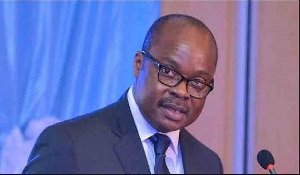Bank of Ghana’s Annual Report for 2022 has revealed a significant loss of GHC 60.8 billion, marking a stark contrast from the GHC 1.2 Billion profit it achieved in 2021.
As per the 2022 Financial Accounts, the Bank of Ghana‘s loss can be attributed to a decline in the Group’s net worth position, mainly caused by the impact of the Domestic Debt Exchange Programme (DDEP) and the impairment of certain assets within the Group.
The Bank stated that its total liabilities, combined with those of its subsidiaries, surpassed its total assets by GHC54.52 billion. In contrast, the Bank had recorded a surplus of GHC5.72 billion in 2021.
Breakdown of Loss Positions
The impairment of Government of Ghana securities holdings amounted to GHC48.45 billion, resulting from the Government of Ghana Domestic Debt Exchange Programme. Additionally, there was an impairment of loans and advances granted to quasi-government and financial institutions, totaling GHC6.12 billion.
The devaluation of the local currency led to a net exchange loss of GHC5.27 billion, in contrast to a gain of GHC1.07 billion in 2021.
Impact of Loss on Operations
According to the Bank of Ghana, the Board of Directors and Management of the Bank have assessed the policy solvency implications arising out of the negative net worth position and the Group’s ability to continue to generate enough income to cover its monetary policy operations and other operational costs.
In the view of the Directors, the Bank will continue to operate on a going concern basis due to a variety of factors underpinned by expectations of an improved macroeconomic situation and policy actions specifically targeted at improving the balance sheet of the Bank of Ghana.
Steps taken to recover from the losses
The Bank of Ghana in its Annual report outlined these measures which they believed that it will aid to their recovery. These include:
- Retention of profits to help rebuild capital until equity firmly returns to positive region.
- Refraining from monetary financing of the Government of Ghana’s budget. In this respect, action has already been taken with a Memorandum of Understanding on zero financing of the budget signed between the Bank of Ghana and the Ministry of Finance on 26 April, 2023;
- Taking immediate steps to optimize Bank of Ghana’s investment portfolio and operating cost mix to bolster efficiency and profits; and
• Assessing the potential need for recapitalisation support by the government in the medium-to-long term.
The Board of Directors and Management are of the view that “ continued efforts at restoring macroeconomic stability and debt sustainability in addition to long-term efforts at building reserves, provide enough basis for continued operational policy efficiency existence for the foreseeable future”.
Impact of the Domestic Debt Exchange Programme on the Banking Sector and Bank of Ghana Interventions
All 23 Banks signed on to Government’s DDEP by the settlement date of 21 February 2023. The Bank of Ghana conducted stress tests on banks, which showed elevated risk exposures of the DDEP on banks’ solvency, liquidity, and profitability. Thus, to manage the potential impact of the debt exchange and preserve financial stability, the Bank announced some policy and regulatory reliefs for Banks that fully participated in the DDEP.
The Bank rolled out these reliefs for the commercial Banks to deal with expected shocks.
- Reduction of the Cash Reserve Ratio (CRR) from thirteen percent (13%) to twelve percent (12%) on foreign currency deposits to be held in foreign currency;
- Reduction of the Capital Conservation Buffer from three percent (3%) to zero, effectively reducing the minimum Capital Adequacy Ratio (CAR) from thirteen percent (13%) to ten percent (10%), intended to provide capital relief to banks after the implementation of the Debt Exchange;
According to the Bank of Ghana it is fully equipped to provide liquidity support to banks and banks can access the Bank of Ghana’s Emergency Liquidity Assistance (ELA) Funds using the new bonds as collateral. The Bank of Ghana has also enhanced its supervisory surveillance systems with banks.
Banks are required to report more frequently, such as daily submissions of balance sheet as well as liquidity reports including interbank market activities and cost of financing.
Additional reporting requirements have been developed for banks to report on the performance of the new bonds. The enhanced monitoring mechanism is to ensure timely supervisory intervention, if needed.
The Bank of Ghana maintains that these reliefs are designed to minimise the potential impact of the domestic debt exchange on the financial sector and to preserve financial stability.
Bank of Ghana’s Gold Purchase programme
The Bank of Ghana commenced the Domestic Gold Purchase (DGP) programme and a Gold for Reserve Programme in June 2021 with the objective of increasing its foreign reserves. The Bank did this by purchasing refined gold from certified domestic gold mining firms using local currency. The refined gold is then shipped to the Bank’s offshore gold custodians, and it becomes part of the Bank’s reserves.
The Bank also purchases dore gold from local gold mines using aggregators. The price of the dore gold is determined using market prices adjusted for the gold content (estimated to be ninety-three percent (93%).
The Bank of Ghana maintains that these reliefs are designed to minimise the potential impact of the domestic debt exchange on the financial sector and to preserve financial stability.


